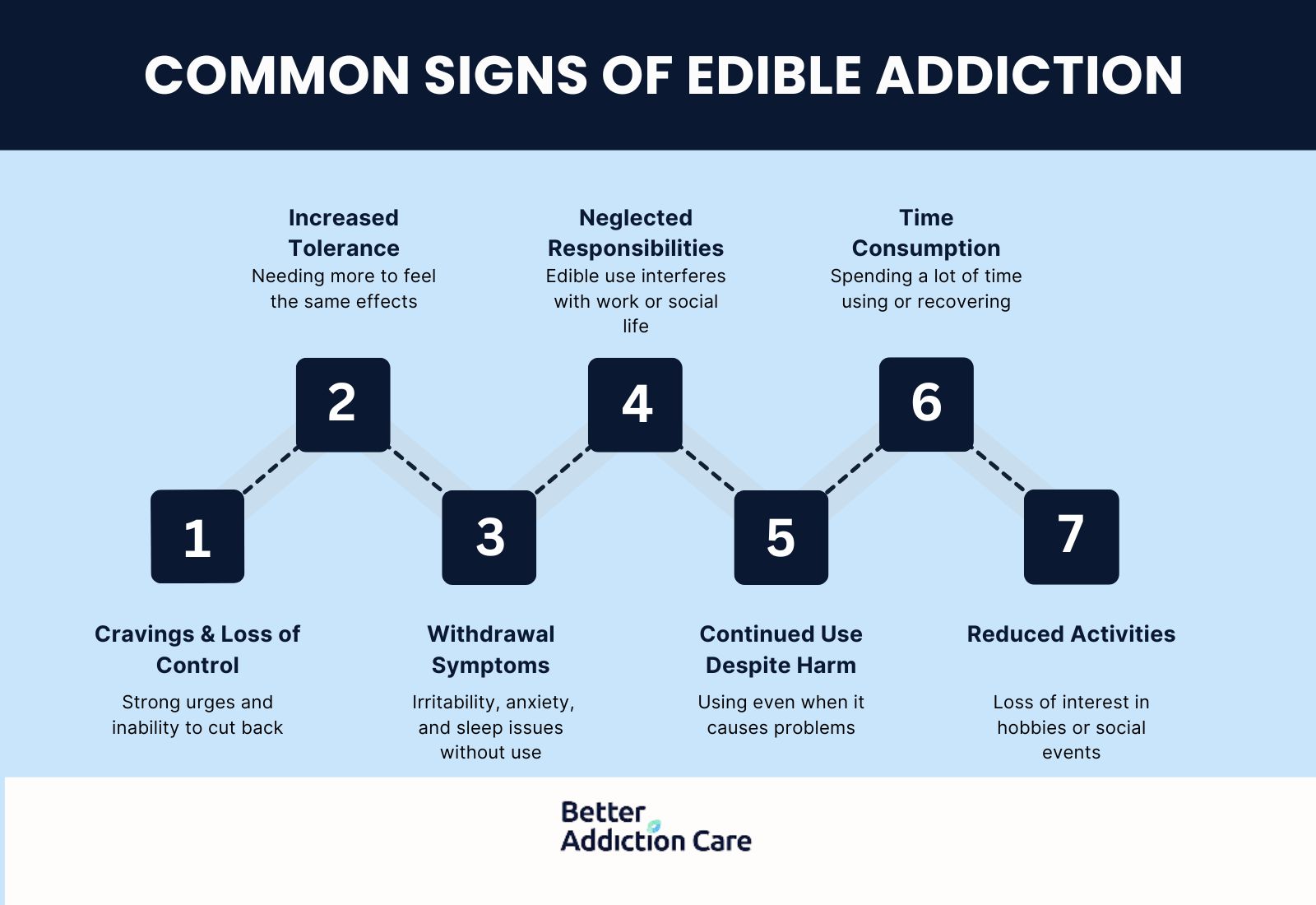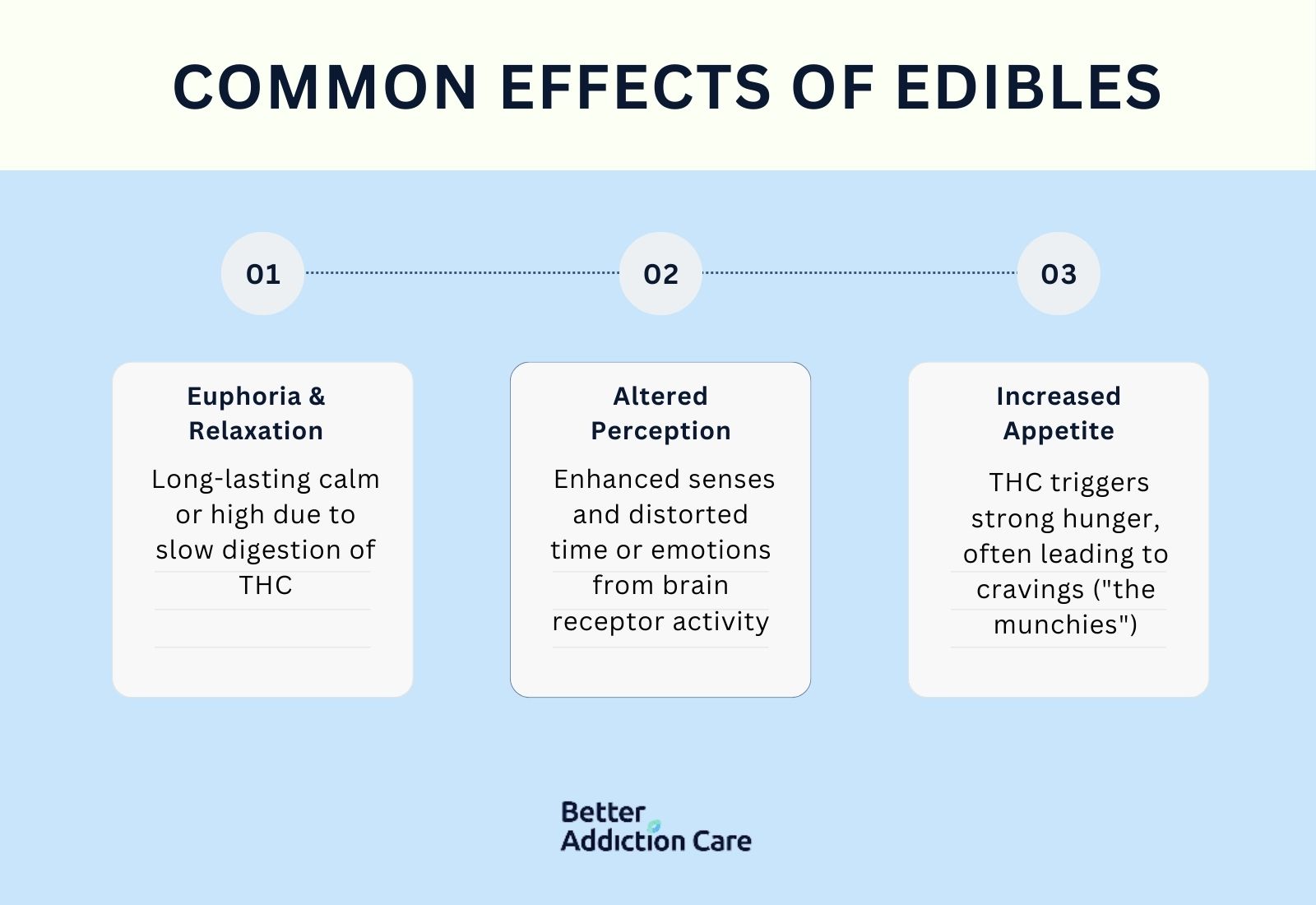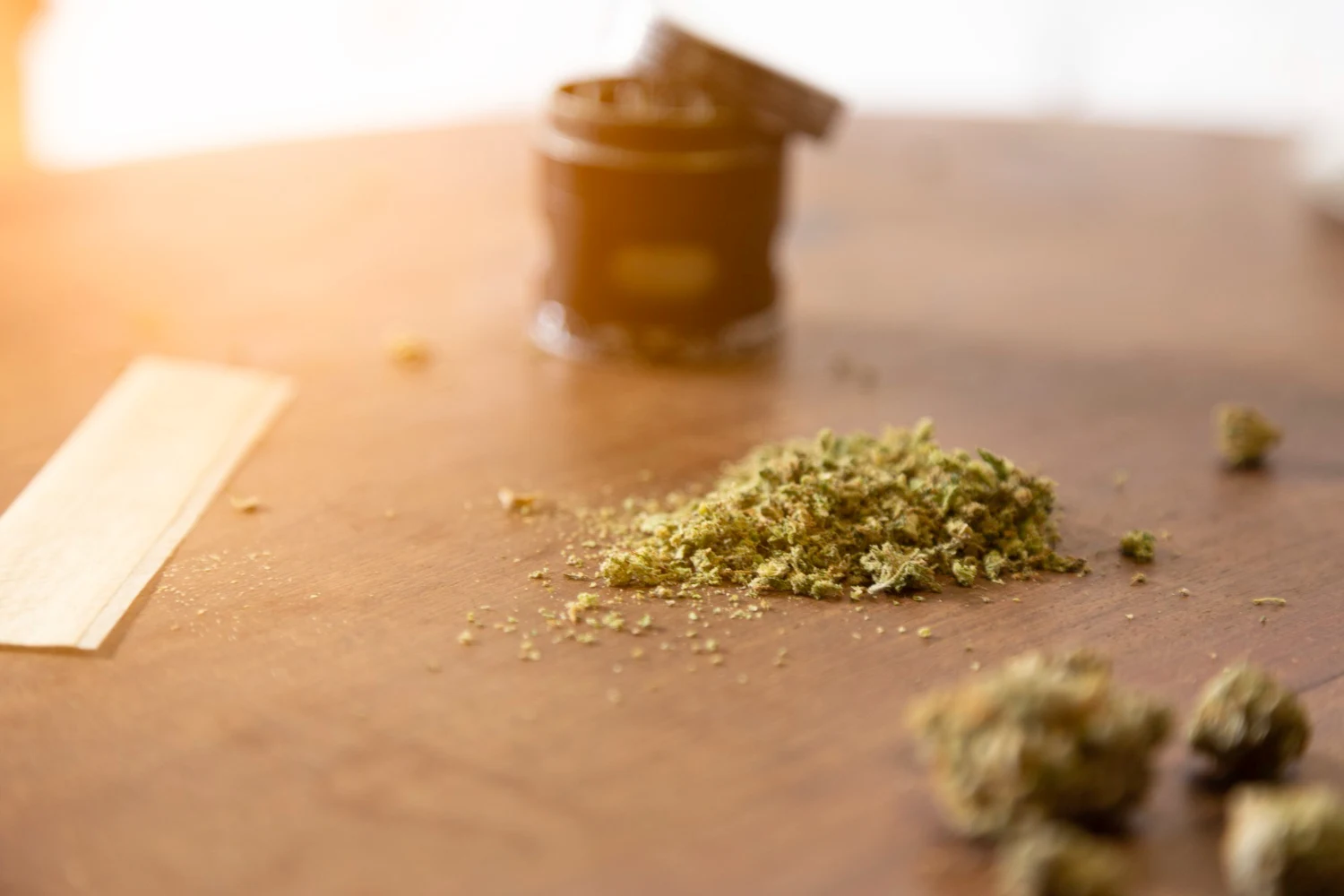Are Edibles Addictive: Signs, Effects, and Behavioral Dependence
Edibles are addictive their high THC potency, delayed onset of effects, and potential for behavioral dependence. cannabis edibles are addictive, especially with frequent or high-dose use.
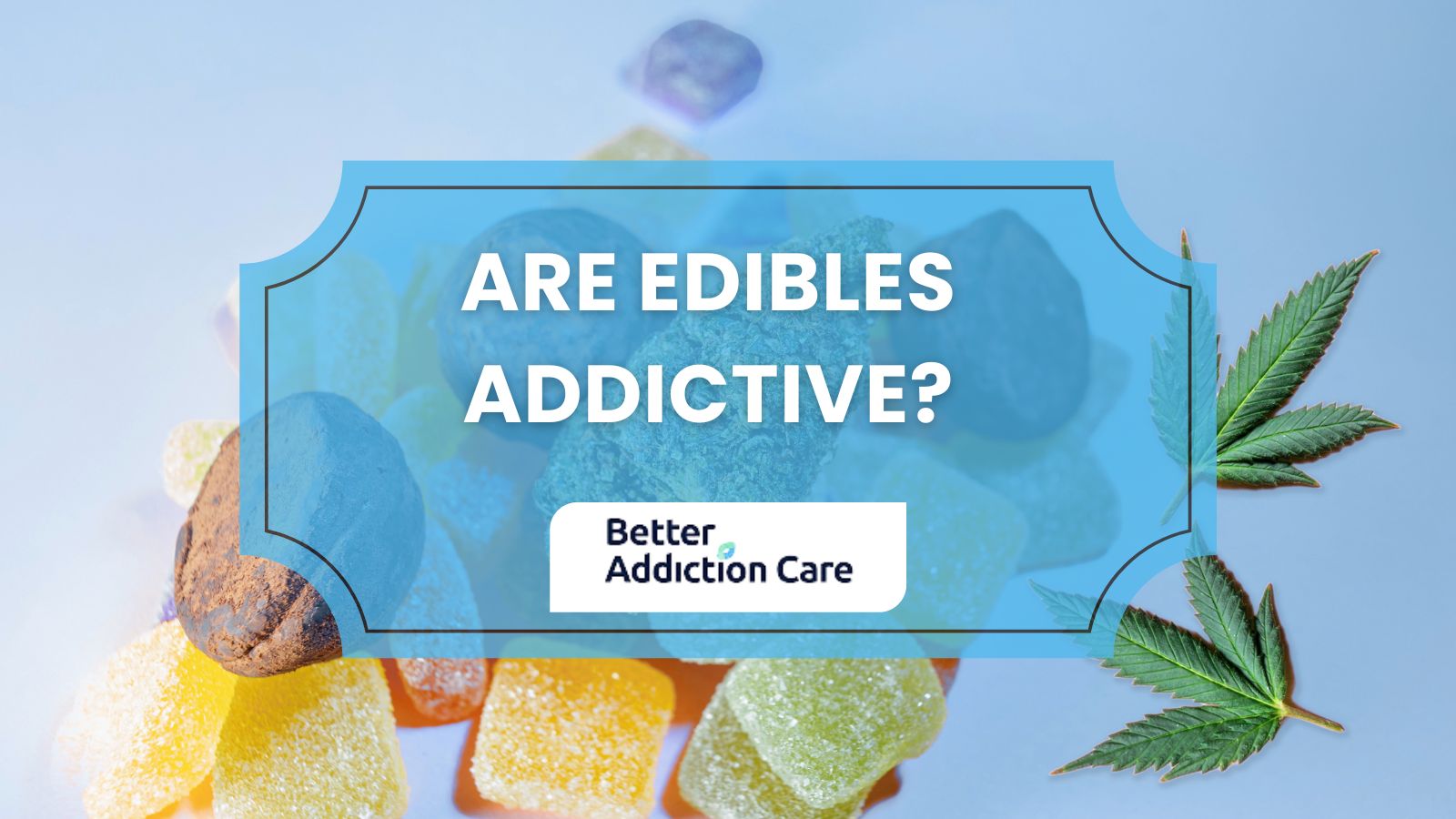
Edibles are addictive their high THC potency, delayed onset of effects, and potential for behavioral dependence. cannabis edibles are addictive, especially with frequent or high-dose use.
Common signs of edible addiction include cravings and loss of control, increased tolerance, withdrawal symptoms, neglect of responsibilities, persistent use despite harm, time spent using or recovering, and reduced engagement in important activities.
The effects of edibles lead to addiction through their powerful impact on the brain. Euphoria and relaxation stem from THC's interaction with neuronal receptors, creating a strong sense of well-being.
This altered perception enhances sensory experiences and emotional states, making activities more enjoyable. Additionally, THC binding to cannabinoid receptors increases appetite, resulting in intense food cravings. These effects create a cycle of dependence, driving users to seek out edibles repeatedly.
If you or your loved one is suffering from edible abuse, Better Addiction Care specializes in connecting individuals struggling with cannabis edibles addiction to effective treatment solutions. Our extensive network includes facilities equipped to address the unique challenges of THC dependence from edibles consumption. Through our free insurance verification and 24/7 confidential helpline, we streamline access to specialized care for edible abuse, helping clients overcome dependency and develop healthier lifestyles free from cannabis edibles.
Are Edibles Addictive?
Yes, edibles are addictive. Cannabis edibles contain Tetrahydrocannabinol/THC, which has addictive properties. Regular consumption leads to tolerance, requiring higher doses to achieve the same effects.
Some users develop cannabis use disorder, characterized by dependence and withdrawal symptoms. The risk increases with frequent, high-dose consumption and early-age initiation.
The potency of edibles contributes to their addiction potential. The liver converts THC to 11-hydroxy-THC, a more potent compound that creates stronger, longer-lasting effects.
Warning signs of addiction include using edibles to cope with stress, interference with daily responsibilities, failed attempts to quit, and withdrawal symptoms when stopping. Professional treatment helps those struggling with edible addiction.
Edibles, an increasingly common means of consuming cannabis, offer a delicate and handy way to feel the effects of marijuana without the need to smoke. These items, which are found as baked goods, candies, or beverages infused with cannabis extracts, have grown in popularity in areas where marijuana is legal for medicinal or recreational use. Nonetheless, despite their widespread use and availability, it is critical to understand not only their effects but also the possible negative impact on drug test results.
What Are The Signs Of Edible Addiction?
The signs of edible addiction include intense urges with difficulty limiting consumption, requiring increased doses for effects, experiencing irritability when abstaining, continuing use despite negative impacts on daily responsibilities, using despite awareness of harmful consequences, dedicating excessive time to consumption, and abandoning important activities.
Listed below are the 7 common signs of edible addiction.
- Craving and Loss of Control: Strong desire or urge to use edibles and difficulty controlling or reducing use despite attempts.
- Increased Tolerance: Needing higher doses of edibles over time to achieve the desired effects.
- Withdrawal Symptoms: Experiencing irritability, anxiety, sleep disturbances, or other physical and psychological symptoms when not using edibles.
- Neglect of Responsibilities: Continued use despite negative impacts on work, school, or social life.
- Persistent Use Despite Harm: Using edibles even when aware of physical, psychological, or social problems caused or worsened by use.
- Time Spent Using or Recovering: time spent obtaining, using, or recovering from the effects of edibles.
- Reduced Activities: Giving up or reducing important social, occupational, or recreational activities due to edible use.
What Are the Effects of Edibles?
The effects of edibles include euphoria, heightened sensory experiences, and increased appetite, which occur as cannabinoids interact with brain receptors. When consumed, edibles are processed through digestion before entering the bloodstream, resulting in a more gradual onset and longer-lasting experience compared to smoking. Individual responses vary based on metabolism, tolerance, and dosage, with effects ranging from relaxation and altered time perception to enhanced creativity and intensified food cravings.
Listed below are the 3 common effects of edibles.
-
Euphoria and Relaxation: Edibles produce euphoric and sedative effects as cannabinoids like THC attach to neuronal receptors. This interaction alters neurotransmitter release, impacting feelings, thoughts, and reactions to stress. Cannabinoids in edibles undergo digestion before entering the bloodstream, resulting in gradual effects that last several hours, unlike smoking. Individual experiences vary; some encounter unpleasant side effects due to factors such as metabolism and dosage.
-
Altered Perception: Edibles induce intoxicating effects through THC's interaction with cannabinoid receptors in the brain. This connection enhances sensory experiences, amplifies sounds and colors, and alters time perception. Users experience changes in emotional states and mental habits, fostering contemplation and creativity. THC effects vary based on tolerance, dose, and individual sensitivity. The slower metabolism of THC in the digestive tract results in prolonged effects.
-
Increased Appetite: Edibles stimulate appetite as THC binds to cannabinoid receptors in the brain, triggering hunger. This effect, known as "the munchies," increases cravings for savory or sweet foods, complicating food intake control for some individuals. Appetite stimulation levels depend on individual factors such as dosage and metabolism.
How Does Behavioral Dependence on Cannabis Edibles Develop?
Behavioral dependence on cannabis edibles develops when repeated use becomes a learned coping mechanism for stress, anxiety, boredom, or emotional discomfort. The delayed but long-lasting effects of edibles can create a reinforced pattern where individuals rely on them to regulate mood or enhance experiences, gradually replacing healthier coping strategies. Over time, these reinforced behaviors solidify into habitual use, making it psychologically challenging to cut back or quit, even without severe physical withdrawal symptoms.
What Makes Edibles So Powerful?
Edibles are powerful because THC is metabolized in the liver into 11-hydroxy-THC, a compound that produces stronger and longer-lasting psychoactive effects than inhaled cannabis.
The liver transforms THC into a more potent compound, while the slow absorption through digestion means effects take hours to appear and persist much longer than other consumption methods.
Listed below are the 5 main reasons that make edibles so powerful.
- Metabolism and Potency: After intake, the liver breaks down THC into 11-hydroxy-THC, a stronger metabolite. This increased potency results in intense and long-lasting effects, potentially overwhelming users.
- Delayed Onset: Edibles exhibit a delayed onset compared to smoking or vaping. This delay leads users to overconsume, as they do not feel the immediate effects. Accidental overconsumption causes uncomfortable and disturbing side effects.
- Dosing Difficulty: Determining the appropriate dosage for edibles proves challenging due to variations in individual metabolism, tolerance levels, and product strength. This lack of control increases the risk of excessive THC intake, leading to negative side effects such as anxiety, paranoia, and hallucinations.
- Variable Strength: Edibles, whether homemade or commercially produced, exhibit strength variability, even between batches. This inconsistency poses serious risks to users' physical and mental health due to unpredictable effects and potential overdose from uneven THC distribution.
- Extended Duration of Effects: The effects of edibles last for hours, sometimes days, after consumption, longer than smoked cannabis effects. Users struggle to manage the intensity of the experience, increasing the likelihood of prolonged discomfort or adverse reactions.
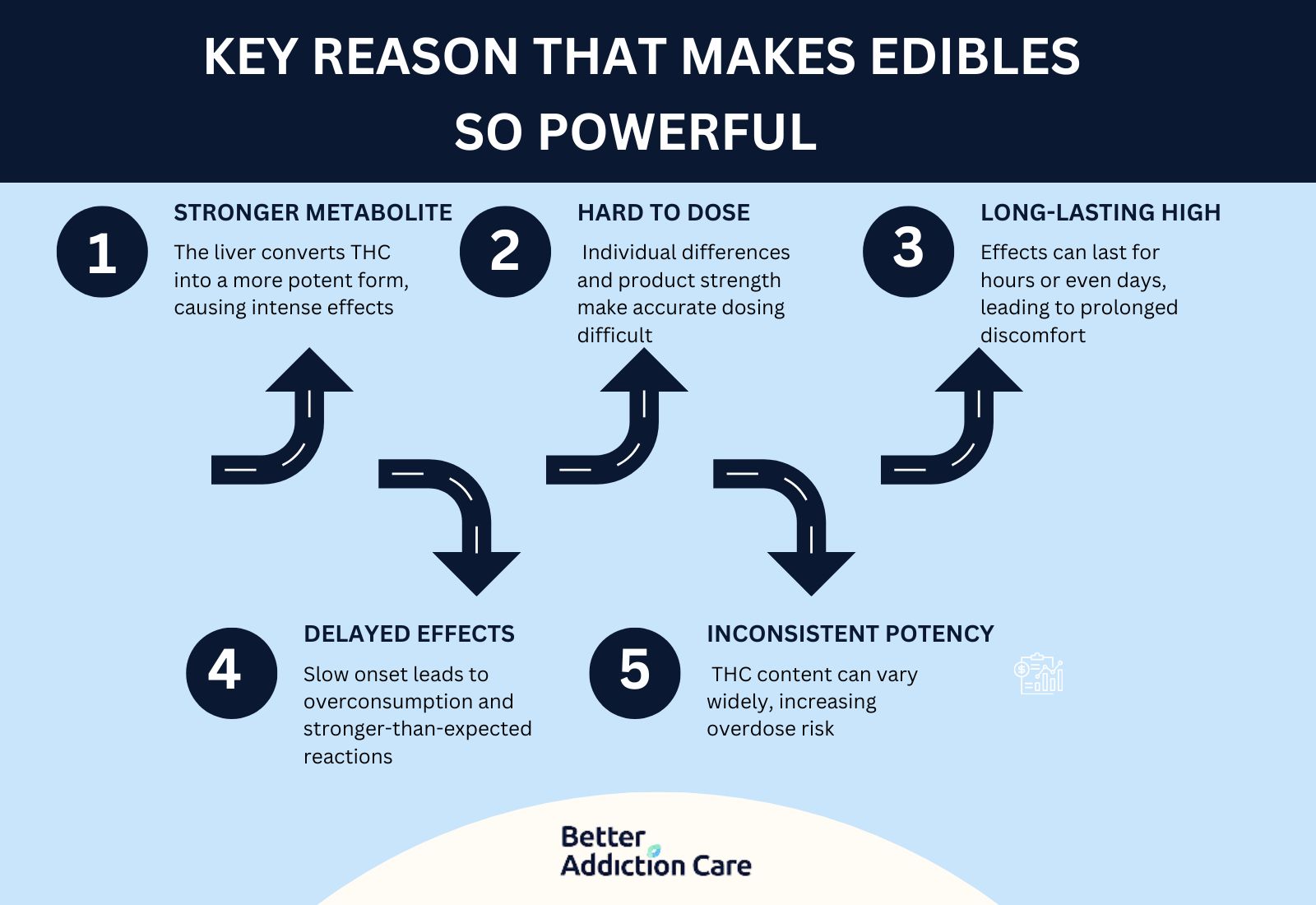
How Can Behavioral Dependence on Cannabis Edibles Be Effectively Treated?
Behavioral dependence on cannabis edibles can be effectively treated through a combination of cognitive-behavioral therapy (CBT), motivational interviewing, and structured relapse prevention planning. CBT helps individuals identify and replace the thought patterns and triggers that drive compulsive use, while motivational interviewing enhances readiness to change by aligning treatment goals with personal values.
Support groups, mindfulness practices, and lifestyle adjustments, such as incorporating stress-reducing activities and healthier coping mechanisms, further reinforce recovery. In some cases, treatment also involves addressing co-occurring mental health conditions to reduce the likelihood of relapse.
How Does Tetrahydrocannabinol(THC) Potency Affect Edible Addiction Risk?
Higher THC potency in edibles increases the risk of addiction by intensifying psychoactive effects, promoting tolerance, and heightening the likelihood of dependence. Potent edibles deliver larger doses of THC in a single serving, which leads to stronger euphoric responses and reinforces repeated use.
Over time, this accelerates the development of cannabis use disorder, as the brain adapts to elevated THC levels, requiring more to achieve the same effects and triggering withdrawal when not used. The slow onset and prolonged effects of high-potency edibles also make it easier to consume excessive amounts before feeling the full impact, further raising addiction potential.
Why Does Delayed Onset Increase Edible Overuse?
Delayed onset increases edible overuse because the effects take longer to appear, leading users to consume more before the initial dose has fully taken effect. Edibles take 30 minutes to 2 hours to produce noticeable results, which will cause impatience or the mistaken belief that the first dose was insufficient.
This “stacking” of doses results in excessive THC intake, intensifying psychoactive effects, increasing the risk of anxiety, paranoia, or hallucinations, and raising the likelihood of developing dependence over time.
What Are The Negative Health Impacts of Edibles?
The negative health impacts of edibles include overconsumption risks, severe psychological effects, cognitive impairment, potential for dependence, and dangerous medication interactions.
Listed below are the 5 negative health impacts of edibles.
-
Overconsumption: Overconsumption represents a major hazard associated with edibles. The delayed onset of effects and the difficulty in precise dosing lead consumers to mistakenly ingest more THC than intended, resulting in unpleasant reactions and discomfort.
-
Psychological Symptoms: Consumption of THC-rich edibles causes severe psychological symptoms, including anxiety, paranoia, panic attacks, and hallucinations.
-
Impaired Cognitive Function: THC, a psychoactive compound in cannabis, impairs cognitive functions such as memory, concentration, and decision-making. Prolonged or frequent consumption of THC-rich edibles results in chronic cognitive impairment, especially in teenagers and young adults whose brains are still developing.
-
Dependence and Addiction: Consistent and excessive cannabis consumption, including edibles, leads to dependence and addiction.
-
Interactions with Medications: Cannabis interacts with certain pharmaceuticals, including blood thinners, antidepressants, and antipsychotics. Combining edibles with specific medications causes side effects or reduces the medication's effectiveness.
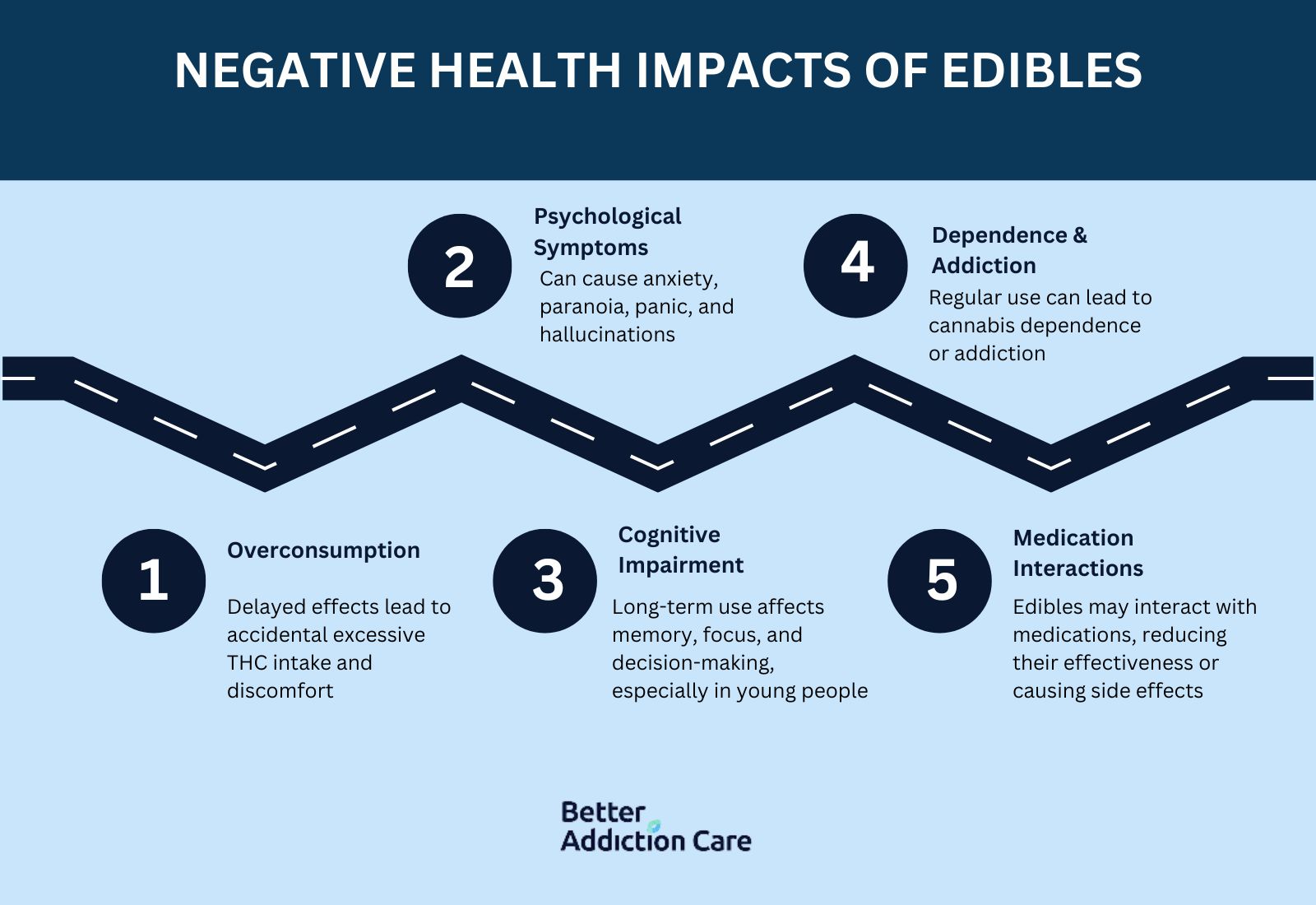
What Makes Edibles Particularly Risky for Addiction?
Edibles are particularly risky for addiction because of their delayed onset, unpredictable potency, and prolonged effects create conditions that increase the potential for misuse and dependence. The late onset of effects leads to re-dosing before the initial dose takes hold, while inconsistent THC labeling results in unintentional overconsumption.
Additionally, the extended duration of psychoactive effects prolongs THC exposure, reinforcing use patterns and strengthening habit formation. These combined factors accelerate tolerance, escalate misuse, and contribute to the development of cannabis use disorder in vulnerable individuals.
What Are the Main Health and Safety Risks Associated With Edible Addiction?
The main health and safety risks of edibles addiction include cognitive impairment, mental health symptoms, accidental ingestion, and increased risk of overconsumption. Cognitive and psychological effects, such as confusion, dizziness, paranoia, and nausea, impair judgment and motor control, raising the likelihood of accidents and falls. Safety concerns are heightened by accidental ingestion, especially among children, due to edibles’ resemblance to regular food products. Additionally, the delayed onset of effects leads to excessive dosing, increasing the risk of severe intoxication and related health emergencies.
Are Edibles Made Of Cannabinoids?
Yes, edibles are made of cannabinoids extracted from the cannabis plant, primarily THC (tetrahydrocannabinol) and CBD (cannabidiol). THC is the psychoactive component responsible for the "high" associated with marijuana use, while CBD offers potential therapeutic benefits without causing intoxication.
Consuming edibles differs from smoking cannabis. When cannabis is smoked, THC enters the bloodstream quickly through the lungs, producing rapid but shorter-lasting effects. In contrast, when edibles are consumed, the liver metabolizes cannabinoids like THC into a more potent compound called 11-hydroxy-THC. This process results in delayed effects, beginning 30 minutes to 2 hours after consumption, but lasting considerably longer, 6-8 hours or more.
Can Edibles Produce Intoxication?
Yes, edibles produce intoxication. Edibles cause intoxicating effects when consumed.
According to the CDC, edibles take from 30 minutes to 2 hours to feel intoxicating effects and cause intoxicating effects that last longer than expected, depending on various factors, including the amount ingested and whether they are eaten on an empty stomach.
Do Edibles Show Up on Drug Tests?
Yes, Edibles show up on drug tests through detectable THC metabolites in blood.
According to Zhao, S.’s 2024 study, ‘The effect of cannabis edibles on driving and blood THC’, participants consumed edibles with an average of 7.3 mg of THC, which produced detectable blood THC levels of approximately 2.8 ng/mL at 2 hours after consumption. Blood analyses revealed increases in THC, COOH-THC, and THC-11-OH, as well as CBD in the cannabis condition compared to the control condition at 120 minutes post-consumption. The research found that despite relatively low blood THC levels, participants experienced subjective intoxication for up to 7 hours and reduced willingness to drive for up to 6 hours.
When to Look for Treatment?
You should look for treatment when you regularly use edibles to cope with emotions or stress. Treatment is also necessary if your cannabis use interferes with work, school, or relationships, or if you experience physical or mental health problems related to edible consumption.
Consider seeking help when cannabis use has become a habit you struggle to control, you notice withdrawal symptoms when attempting to stop, previous attempts to quit have been unsuccessful, or friends and family express concern about your cannabis use. Seeking professional help is an essential first step toward overcoming cannabis use disorder and beginning your recovery journey.
How Can Local Drug Rehab Centers Help with Edible Addiction?
Local drug rehab centers treat edible addiction through specialized programs addressing both physical dependency and psychological aspects of cannabis consumption. These facilities deliver comprehensive assessments, detoxification services, and evidence-based therapies designed for marijuana edible dependencies.
Edible addiction creates distinct challenges due to the potent, long-lasting effects of THC in food form. Professional rehabilitation includes cognitive behavioral therapy, motivational enhancement therapy, and group support specifically targeting marijuana use disorders.
Finding the right local drug rehab facility ensures individuals receive personalized treatment plans addressing their specific needs. Better Addiction Care connects patients with centers offering specialized marijuana treatment programs, including education about cannabis effects, coping mechanisms for cravings, and relapse prevention strategies.
Our treatment center network provides both inpatient and outpatient recovery options. Inpatient facilities offer structured environments away from triggers, while outpatient programs allow maintenance of daily responsibilities during treatment. Better Addiction Care's free insurance verification helps individuals find affordable treatment options covered by their health insurance.
Related Articles
Treatment Centers in Virginia




